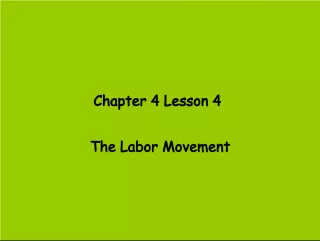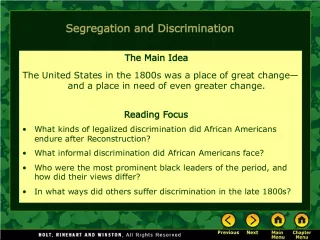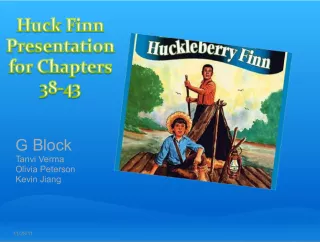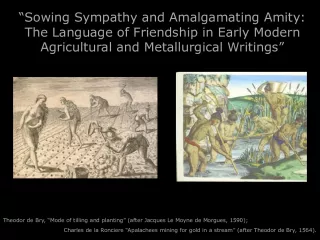"North Carolina in the Early 1800s and the Trail of Tears"
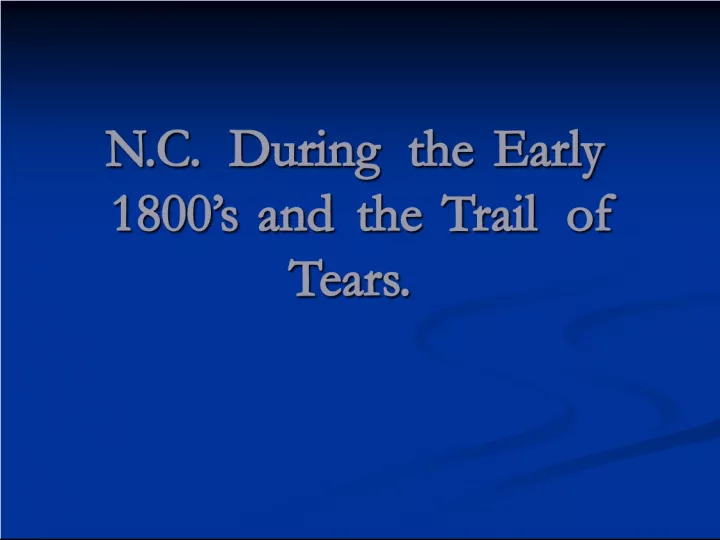

This article explores the state of North Carolina during the early 1800s and the impact of the Trail of Tears on Native American communities in the region
- Uploaded on | 4 Views
-
 vincent34
vincent34
About "North Carolina in the Early 1800s and the Trail of Tears"
PowerPoint presentation about '"North Carolina in the Early 1800s and the Trail of Tears"'. This presentation describes the topic on This article explores the state of North Carolina during the early 1800s and the impact of the Trail of Tears on Native American communities in the region. The key topics included in this slideshow are . Download this presentation absolutely free.
Presentation Transcript
Slide1N.C. During the Early 1800’s and the Trail of Tears. N.C. During the Early 1800’s and the Trail of Tears.
Slide2Rip Van Winkle State – A phrase referring to North Carolina between the years of 1812-1835. North Carolina had fallen behind the other states as if to say “they have fallen asleep”. Rip Van Winkle State – A phrase referring to North Carolina between the years of 1812-1835. North Carolina had fallen behind the other states as if to say “they have fallen asleep”.
Slide3North Carolina’s Economy – Based on agriculture. North Carolina’s Economy – Based on agriculture. North Carolina’s Education – Very few parents sent their children to school. They worked on the farms instead. North Carolina’s Education – Very few parents sent their children to school. They worked on the farms instead. Slavery in North Carolina – Many people owned slaves especially wealthy plantation owners. Slavery in North Carolina – Many people owned slaves especially wealthy plantation owners.
Slide4The Impact of isolation The Impact of isolation People lived far apart on scattered farms People lived far apart on scattered farms There was a lack of roads and means of communication There was a lack of roads and means of communication Produced only goods that were absolutely necessary. Produced only goods that were absolutely necessary. Individualism- People were only concerned with their own individual needs and freedoms. They didn’t want their state to tell them to pay taxes or send their children to school. Individualism- People were only concerned with their own individual needs and freedoms. They didn’t want their state to tell them to pay taxes or send their children to school.
Slide5EconomyEconomy The invention of the Cotton Gin by Eli Whitney helped to make agriculture the basis of the state’s economy. The invention of the Cotton Gin by Eli Whitney helped to make agriculture the basis of the state’s economy. Many people lost interest in manufacturing or any other crops (like food). Many people lost interest in manufacturing or any other crops (like food). Food crops and other goods needed to be bought from other states. Food crops and other goods needed to be bought from other states.
Slide6Indian Removal Act Indian Removal Act Passed in 1830 by President Andrew Jackson that set up treaties with the Indians to give up their land east of the Mississippi in exchange for land west of the Mississippi. Those Native American who did not go peacefully were removed forcefully from their land.
Slide7Cherokee Indians Cherokee Indians Lived peacefully in the Appalachian Mountains of Georgia and Tennessee Adopted culture of whites - wrote and spoke English Had own written language and newspaper Based their government on the U.S. Constitution
Slide8Trail of Tears Trail of Tears In 1838 more than 14,000 Cherokee were forced to march by gunpoint out of their homeland in the southern states to Indian Territory in Oklahoma. During the 1,200 mile and six month march more than 4,000 died of cold, hunger, and diseases.
Slide10Trail of Tears Assignment Trail of Tears Assignment Write a three entry diary about your experiences on the Trail of Tears and how your life was/will be affected by the move from Georgia to Oklahoma. Read page 287- 289 Write a three entry diary about your experiences on the Trail of Tears and how your life was/will be affected by the move from Georgia to Oklahoma. Read page 287- 289 Entry One - Before you leave (when the soldiers came into your home) Entry One - Before you leave (when the soldiers came into your home) Entry Two - On the Trail (struggles during the trip) Entry Two - On the Trail (struggles during the trip) Entry Three - When you arrive in Indian Territory (how life has changed) Entry Three - When you arrive in Indian Territory (how life has changed) Detail earns points - cover emotion, fears, pain, successes with colorful adjectives and adverbs Detail earns points - cover emotion, fears, pain, successes with colorful adjectives and adverbs Due next class Due next class

